- Home
- Lionel Shriver
The Standing Chandelier Page 3
The Standing Chandelier Read online
Page 3
For that matter, Jillian largely failed to understand what drew anyone to anyone. It was one of those mysteries of the universe that the vast majority of people were able to convince someone else to singularly adore them, when any given suitor was free to choose from billions of alternatives—and these successful bondings encompassed portly shop assistants with prominent nose hair, severe-looking Seventh-Day Adventists with a penchant for hoarding felt-tip pens, and timid Filipina housemaids with wide, bland faces and one leg shorter than the other. It was astonishing that so many far-fetched candidates for undying devotion managed to marry, or something like it. Were it up to Jillian to fathom why her peers might logically invite lifelong ardor in order for them to pair off, the species would dwindle, until our worldwide population could snug into a boutique hotel. So what the hell, she’d long ago given up on second-guessing romantic attraction.
Meanwhile, Jillian had embarked on her most ambitiously futile project yet. Forty-three seemed just old enough to afford a retrospective. Were she a writer, she might have accrued sufficient experience to start a memoir. She was not a writer, but still being something of a curator of her own life, and having remained in the same cottage for fourteen years, she’d accumulated all manner of flotsam—the residue of multifarious adventures that she might convert from clutter to precious construction materials. At first she titled the assemblage “The Memory Palace,” but the expression was derivative. At length, she settled on a fresher designation: “The Standing Chandelier.”
Ambling into the living room in his bathrobe, Weston seemed to have walked into a conversation that, one-hand-clapping, was already under way.
“You know, this pretense Jillian has,” Paige said, apropos of nothing, “that she’s not really an artist—”
“Frisk likes to make stuff,” he objected, rubbing his eyes. “That’s all. It’s posing as an Artist that’s pretentious.”
Paige was dusting. While any given day of the week was as good as any other to him, weekends meant something to her, and this swabbing, scouring, and polishing on a Saturday seemed a waste. The A-frame did have a more focused feel to it once she finished, even if he couldn’t consciously detect how anything had changed. Yet the swish-swish of the cloth today conveyed an impatience. It may have been three in the afternoon, but he’d just gotten out of bed (having had to set his alarm to do so), and this was far too much vigor in his surround before coffee.
“But not really doing anything, and all her dumb little jobs. There’s something a little spoiled about it.”
“I don’t follow,” Weston said.
“It has to do with … class, really. Like, if she came from humble roots, having no ambition, and not participating in the art world proper, would seem like having low self-esteem. But because her father’s a surgeon, being a big nobody is supposedly brave or something. Admirable and daring and original. Whereas the truth is that Jillian won’t play the game because she doesn’t want to lose.” Swish-swish, went the cloth. “She’s just afraid of judgment.”
“Who wouldn’t want to avoid judgment?”
“People who can make the grade, that’s who. There’s nothing upsetting about being judged if it turns out that everyone thinks you’re wonderful.”
“Uh-huh. And these days, when does that happen? Look at the internet. It’s nothing but a lynch mob, braying about how shit everything is. I don’t blame Frisk for not wanting to stick her neck out. Perfect formula for getting your head chopped off.”
“She doesn’t call herself an artist, because then she’d have to be a bad artist. Most of the junk she cobbles together is just—kooky. God, I wish you could find a way of telling her to stop bringing by those necklaces, made of feathers and, like, bat guano. You’d think she’d notice I never wear them.”
This interchange required some serious caffeine, so Weston passed on the cafetière and went straight for the espresso machine. He was reminded that one thing he liked about Paige was pushback. When he and Frisk conferred, they tended to agree on everything, which was restful, but it wasn’t sharpening. “You tell her to stop with the necklaces, then,” he said.
“No, if I start telling Jillian what I really think, there’s no telling where it will lead. Like, I can’t bear the way she calls you ‘Baba.’ It’s such a dumb name. Like rum baba, or baba ghanoush. Or like Bill Clinton’s white trash nickname—Bubba.”
“So is your problem that it’s culinary, or that it’s redneck?”
“My problem is it’s not your name. And it’s presumptuous. This little claiming, like, ‘You’re my special friend with a special name that I gave you that only I get to use.’ You’d think she’d have the good grace to at least call you Weston when I’m around.”
“It would sound artificial,” he said wearily. “After well over twenty years? Like coming here and suddenly calling me ‘Mister Babansky.’”
“I could live with ‘Mister Babansky,’” Paige muttered. “A little regard for boundaries would be more than welcome.”
Weston always woke slowly, emerging from bed in a bumbling, bearlike state that Paige commonly found beguiling; on more promising Saturday afternoons, she’d have tackled him back to the sheets. One of the perks of keeping such different schedules was that sex was a daytime activity, which had nothing to do with sleep. Paige was an inventive lover, with an appetite her low-key apparel and cropped, easy-maintenance haircut might seem to belie. He was well aware that Frisk found his relationship a measure perplexing—she was never good at keeping such thoughts to herself, even if she imagined she was being tactful; Frisk’s version of discreet was everyone else’s foot-in-mouth disease—and the often psychotropic frenzies with Paige, whose exquisitely subtle breasts drove him wild, were a big piece of the puzzle. A piece he tended to underplay with Frisk. Guys had been thin on the ground for her recently, and he didn’t want to rub her nose in his good fortune.
“The truth is,” Paige continued, having moved on to Windexing the wineglass rings on the coffee table, “it kind of grates when you call her ‘Frisk,’ too. Like you’re football buddies in a locker room. That last-name thing, it’s a gruff, shoulder-clapping palliness you usually get over after high school.”
Weston wondered whether he could train himself to refer to Frisk as Jillian at home. The rechristening would take vigilance, but if it made a difference to Paige, the effort might pay off. On the other hand, such constant mental editing was a drain. He didn’t think of his tennis partner as Jillian, and he was well aware that a first-name basis in this instance would amount to a demotion. He would be humoring Paige, too, and that wasn’t a direction he wanted to go. A matter for private debate later. In the interim, he would try to stick to pronouns.
Taking a slug of espresso, he shot an anxious glance at the clock. “What’s biting your butt today?”
“Oh, we’d talked about asking Gareth, Helen, and Bob over in a couple of weeks—our usual History Department crowd—and then I thought, right, great, you’re no doubt expecting we’ll ask Jillian, too.”
“We don’t always ask her.” Jesus, this was exhausting.
“No, but the last time we didn’t, you just had to tell her all about the evening with Vivian and Leo—”
“I couldn’t resist telling her about that nightmare ‘free-form berry tart.’ How the cream cheese pastry kept springing leaks and we had to put it in the freezer—”
“You said you thought she felt hurt.”
“That may have been my imagination. She doesn’t expect to come over every time we entertain.” He didn’t think of himself as someone who entertains.
“But whenever we knock her off the guest list, you feel guilty.”
“A little guilty,” he said, having considered the question for a moment. “And a little relieved. I don’t enjoy being caught in the middle.”
“Then don’t put yourself in the middle.”
“Finding yourself in a position isn’t the same as putting yourself there.”
“Oh, no?
Anyone with volition in a position he doesn’t like can move somewhere else.”
He didn’t have time for this. He pulled the chilled thermos from the fridge, collected his cell, wallet, and keys, and put them by the door. “At least if we did ask her,” Weston tossed off on the way to the bedroom to dress, “with Gareth-and-Helen, and Bob, it would be balanced.”
“Bob doesn’t balance anything, because Bob is gay,” she called after him. “I wish Jillian would at least get another boyfriend.”
“You couldn’t bear the last one!” Weston called, pulling on his shorts.
“He was an idiot. Jillian has terrible taste in men.”
Tennis shoes in hand, Weston came back out pushing his head through his T-shirt. “Thanks.”
Paige looked up sharply, taking in the garb. “But you’re not ‘a man.’ To her. Supposedly.” Her demeanor had suddenly frozen over.
“I’m running late. This’ll have to wait.” Weston yanked his laces, and headed to the carton of balls in the corner to withdraw a new can.
“But it’s Saturday.”
“Frisk … she … got inexplicably caught up in something she’s working on yesterday, and lost track of the time. Not like her, but anyway, we rescheduled. May not get our two hours on a weekend, but one’s better than nothing. See you around six or so. Seven at the latest.” With a wisp of a kiss, Weston snatched his racket and fled. If they did play two hours, he would not be home till eight.
He hadn’t wanted it to be true, and Weston was as capable of self-deceit as the next person, whatever his pretensions to self-knowledge. So it had taken him too long to pick up the pattern. On Mondays, Wednesdays, and Fridays, Paige got in a bad mood.
Weston knew this much about himself: he was prone to confuse thinking about something with doing something about it. So as far as he was concerned, in often turning his mind to Paige’s exasperating and no-little-inconvenient antagonism toward Frisk, he was doing his job.
That Saturday afternoon they were freakishly able to play not two hours but three. Afterward, as Weston kept glancing at his watch in the dimming dusk, Frisk urged him to attend a private unveiling of her latest project, about which she’d been oddly secretive for months. But despite all Weston’s industrious cogitating, it was more challenging than it once had been to arrange to stop by Frisk’s cottage on his own. He introduced the idea to Paige the following week with an ingratiating cynicism that made him dislike himself.
“I have no idea what it is,” he said, paving the way for what he didn’t wish to regard as “permission” to visit his best friend after hours. “I only know she’s made a big deal out of it, and she’s been working on it for a bizarrely long time. You can be sure it’s a little crazy, per usual.”
“Can’t she just bring it along this weekend, now that she’s virtually invited herself to dinner with the history crowd? She could wrap it up in birch bark.”
“I got the impression it doesn’t transport easily. And whatever it is, I’d think you’d be glad to get out of pretending to admire it.”
Weston himself had tried to maintain a studious neutrality in relation to Frisk’s creations. He took at face value her reluctance to participate in the professional art world, and one upside to her having carved out the right to “make stuff” outside the aegis of galleries—she did give things away, but she never sold anything—should have been release from assessment. Yet it was infernally difficult to suspend your critical faculties. In cosmopolitan culture—and the better educated in isolated college towns like Lexington held on to every signature of sophistication for dear life—the impulse to appraise was deeply ingrained: this knee-jerk need to no sooner see, hear, taste, or read a thing than to determine how “good” it was. The fashioning of an opinion was almost synonymous with apprehension of the item in question, so that you hardly had a chance to take something in before you got busy deciding what you thought of it—as if failure to come up with an instantaneous verdict made you remiss, or slackwitted. So Frisk’s often whimsical contrivances had given him practice at detachment. Surely there was something to be said for simply looking, without immediately going to work on an estimation, as if you were expected to value the article at hand for insurance purposes.
He did appreciate Frisk’s refusal to acknowledge the artificial boundary between fine art and craft, a line she crossed merrily back and forth all the time. And in one respect he didn’t resist discernment: whatever she made, she made well. If his casual attendance at various galleries in Lexington and even DC was anything to go by, that made her the exception among most would-be artists, whose technical proficiency was often woeful.
Frisk was a better-than-competent carpenter and a skillful welder. The phantasmagoric tiling affixed to her claw-foot bathtub was neatly grouted. Her coffee table slatted together from logoed yardsticks, which hardware stores gave away to customers for free advertising in the 1970s, wasn’t only ingenious, and nicely variegated with accents of red and yellow, but flat. Composing her pointillistic self-portrait made entirely of buttons, she had meticulously picked the residual threads from the holes of the secondhand ones, and had sacrificed several of her own shirts when the color of their fasteners helped fill out the demanding proportion of the surface taken up by the mass of hair—even if the resultant facial expression was unnervingly dazed. However wonky and unwearable Paige might find those strings of beads and found objects, the necklaces would never fall apart—much to his girlfriend’s despair.
Moreover, whatever withering appraisals others might level at what she never even dignified as “her work,” Frisk wasn’t hurting anybody. Every time he entered the house of horrors of a major newspaper, Weston elevated sheer harmlessness to the pinnacle of achievement.
She wasn’t asking for much, either: a smile, a handclap, or a good long stare. Such modest acknowledgment was the least he could supply her, and having showered after tennis on a Wednesday in May, he braved Paige’s tight-lipped silence and promised to be back for dinner.
Frisk met him at the door in one of her floor-length getups. Once black and dotted with tiny red chrysanthemums, the dress had grayed and relaxed from multiple washings. The fabric looked soft—not that he was about to touch it. The near rag had doubtless been cadged from a church basement jumble sale, but especially with the hair it cast her as a Pre-Raphaelite Ophelia. She’d arranged the living room lighting so low it was almost dark. In the middle, resting on her hand-hooked shag rug, loomed an obscure object over six feet tall, poking here and there against the drape of its bedsheet.
“Don’t look now, but your house is haunted,” he said, kissing her cheek hello.
“And how,” she said, insisting on uncorking a Sauvignon blanc before the viewing. She wasn’t usually this dramatic about unveilings, which had never been so literal. Ordinarily, whatever she’d made would be propped in a corner, and she’d point.
“I call it ‘The Standing Chandelier,’ and if I’m honest with myself, this time I really want you to like it.” She clinked her glass against his. “Ready? Close your eyes.”
Weston played along. There was a rustle, then a click.
“Now.”
If a “chandelier,” it was upside down. The object was more of a standing candelabra, with multiple branches welded onto a central trunk in an irregular, botanical pattern. It glittered with dozens if not hundreds of tiny lights, most of them white, with a few incidental accents of yellow and blue. On examination, the lights illuminated a host of miniature assemblages, like individual installations on a minute scale. He knew her life in sufficient detail to infer the provenance of their constituent parts. Her wisdom teeth—pulled in her midtwenties. An admission ticket to the Stonewall Jackson House, where she used to work. The ebony trident-shaped mute would be a memento from that hot fling with a violinist during the fiddlers’ convention. The lavender roll tied with a bow he recognized as the last grip she replaced on her trusty Dunlop 7Hundred, and there were other tennis references, too. One of the arms of t
he candelabra was neatly wound with a busted string; another enclosure included a rubber vibration dampener and a puff of chartreuse that could only have been shaved from their usual Wilsons (extra-duty felt for hard courts). She’d discovered that delicate curlew skull on a walk along the Maury River, the long tweezer of a beak still perfectly intact; it was one of her prize possessions. He spotted some keys, perhaps to old apartments, like the share with that O’Hagan shrew; a diminutive pewter cowbell, a souvenir from the solo Alpine hike through Switzerland on which she got lost for three days; a ribbon-wrapped coil of hair, a distinctive henna with the odd blond highlight, which could only have been snipped from her own head.
There were signatures of childhood: a small windup helicopter (which still worked); an inch-high troll doll trailing pink hair, meant to fit on the end of a pencil; a red-and-gold kazoo and a plastic whistle. The pair of red salt and pepper shakers hailed from her very first airplane journey—museum pieces, from a domestic in-flight meal. One round, green cloth cameo was embroidered with a spool of thread, another with a tent—though the merit badges were few, because Frisk hadn’t lasted long in the Girl Scouts. The 1981 Susan B. Anthony silver dollar was a present from her father on her graduation from sixth grade, the shining feminist symbolism dulled somewhat when the coin was pulled from circulation.

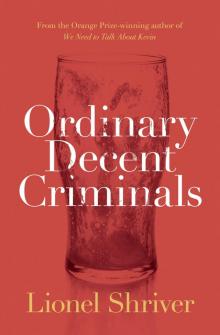 Ordinary Decent Criminals
Ordinary Decent Criminals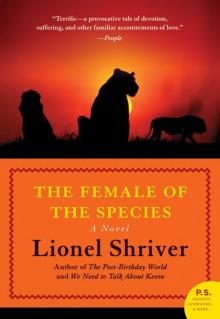 The Female of the Species
The Female of the Species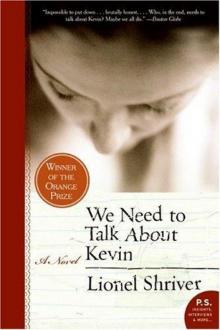 We Need to Talk About Kevin
We Need to Talk About Kevin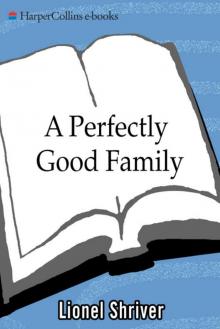 A Perfectly Good Family
A Perfectly Good Family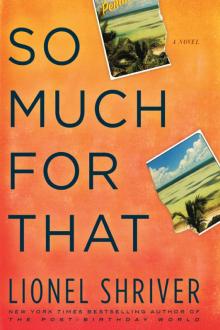 So Much for That
So Much for That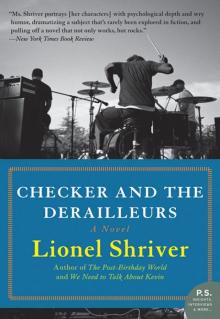 Checker and the Derailleurs
Checker and the Derailleurs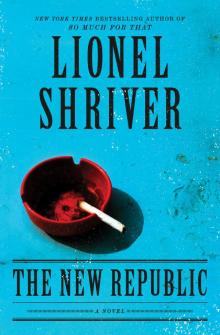 The New Republic
The New Republic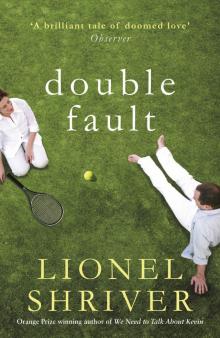 Double Fault
Double Fault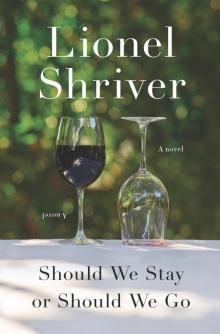 Should We Stay or Should We Go
Should We Stay or Should We Go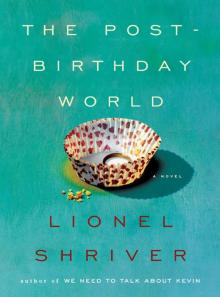 The Post-Birthday World
The Post-Birthday World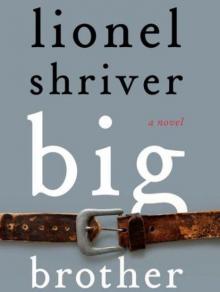 Big Brother
Big Brother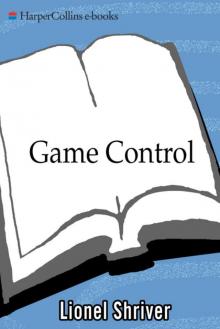 Game Control
Game Control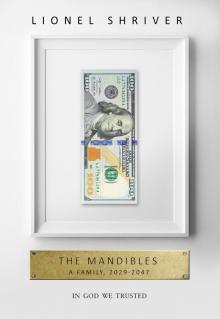 The Mandibles
The Mandibles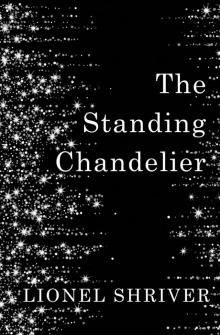 The Standing Chandelier
The Standing Chandelier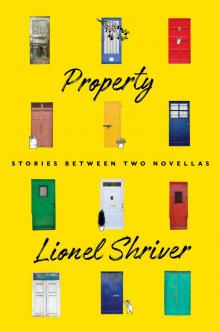 Property
Property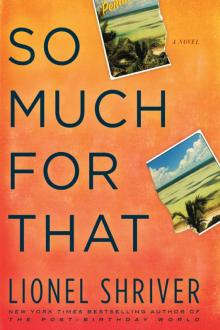 So Much for That: A Novel
So Much for That: A Novel